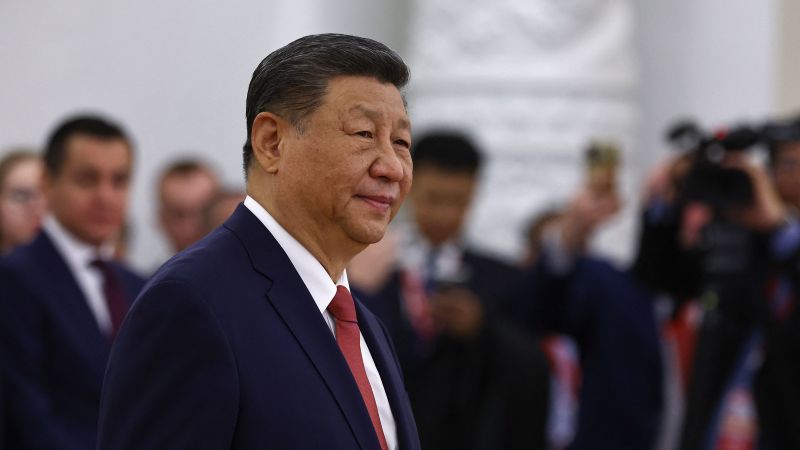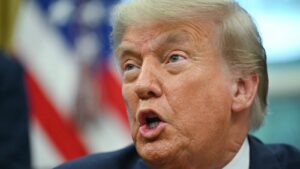
A summit of leaders from the BRICS group of major emerging economies kicks off in Brazil on Sunday, but notably absent is the top leader of its most powerful member. For the first time in over a decade, Chinese leader Xi Jinping, who has made BRICS a cornerstone of his strategy to reshape the global balance of power, will not attend the annual leaders’ gathering.
Xi’s absence from the two-day summit in Rio de Janeiro comes at a pivotal moment for BRICS, which originally included Brazil, Russia, India, China, and South Africa, and has since expanded to include Egypt, the United Arab Emirates, Ethiopia, Indonesia, and Iran. The group faces a July 9 deadline to negotiate U.S. tariffs imposed by President Donald Trump, amidst global economic uncertainties heightened by his disruptive trade policies. Xi’s absence presents a missed opportunity for China to position itself as a stable alternative to the U.S., a role Beijing has long sought to project to the Global South, especially in light of Trump’s “America First” policy.
Strategic Absence or Tactical Decision?
Despite Xi’s absence, observers suggest this does not indicate a diminished importance of BRICS to China. Instead, Xi has delegated his trusted second-in-command, Li Qiang, to represent China, signaling continued commitment to the group. Chong Ja Ian, an associate professor at the National University of Singapore, notes,
“BRICS is part and parcel of Beijing’s effort to ensure it isn’t hemmed in by U.S. allies.”
However, with Trump’s unpredictable foreign policy, the pressure on China may have lessened, allowing Xi to prioritize domestic economic issues.
Beijing might also have tempered expectations for significant breakthroughs at this year’s summit, focusing instead on strengthening energy ties with BRICS’ major oil-exporting members and promoting the use of China’s digital currency within the group. Brian Wong, an assistant professor at the University of Hong Kong, emphasizes that Xi’s absence should not be seen as a snub, stating,
“Whether it be the Sino-Russian partnership or Beijing’s desire to project its purported leadership of the Global South, there is much in BRICS+ that resonates with Xi’s foreign policy worldview.”
Geopolitical Implications and Attendance Dynamics
Xi is not the only notable absentee in Rio. Russian President Vladimir Putin will also participate remotely, due to the International Criminal Court’s charges against him, which could lead to his arrest if he travels to Brazil. This absence shifts the spotlight to Indian Prime Minister Narendra Modi, who will attend both the summit and a state visit. South African President Cyril Ramaphosa is also expected to be present, while some new members have yet to confirm their attendance.
The absence of Xi and Putin provides a unique opportunity for other leaders to assert influence. However, the absence of these heavyweights might also dilute the group’s impact. The recent diplomatic engagements between Xi and Brazilian President Luiz Inácio Lula da Silva, including Xi’s visit to Brazil for the G20 summit and Lula’s visit to China, might mitigate any perceived snub.
BRICS and the Quest for De-dollarization
Launched in 2009, BRICS positions itself as a counterbalance to the Group of Seven (G7) major developed economies, advocating for a “multipolar world.” However, its diverse composition and recent expansion have sparked criticism regarding its effectiveness. The group’s efforts to present a unified stance are often challenged by internal differences, as seen in their cautious response to recent military strikes on Iran.
Despite these challenges, BRICS continues to explore alternatives to the U.S. dollar in trade and finance, a move particularly appealing to sanctioned members like Russia and Iran. Earlier this year, Brazil proposed increasing payment options to reduce vulnerabilities, while Russia advocated for a unique cross-border payments system. However, the ambitious idea of a “BRICS currency,” suggested by Lula in 2023, remains unlikely to materialize, especially given the U.S. threat of imposing tariffs on BRICS countries supporting such a move.
As BRICS members convene in Rio, the world will be watching to see how the group navigates these complex dynamics and whether they can advance their agenda of de-dollarization in a world where U.S. economic influence remains significant.






